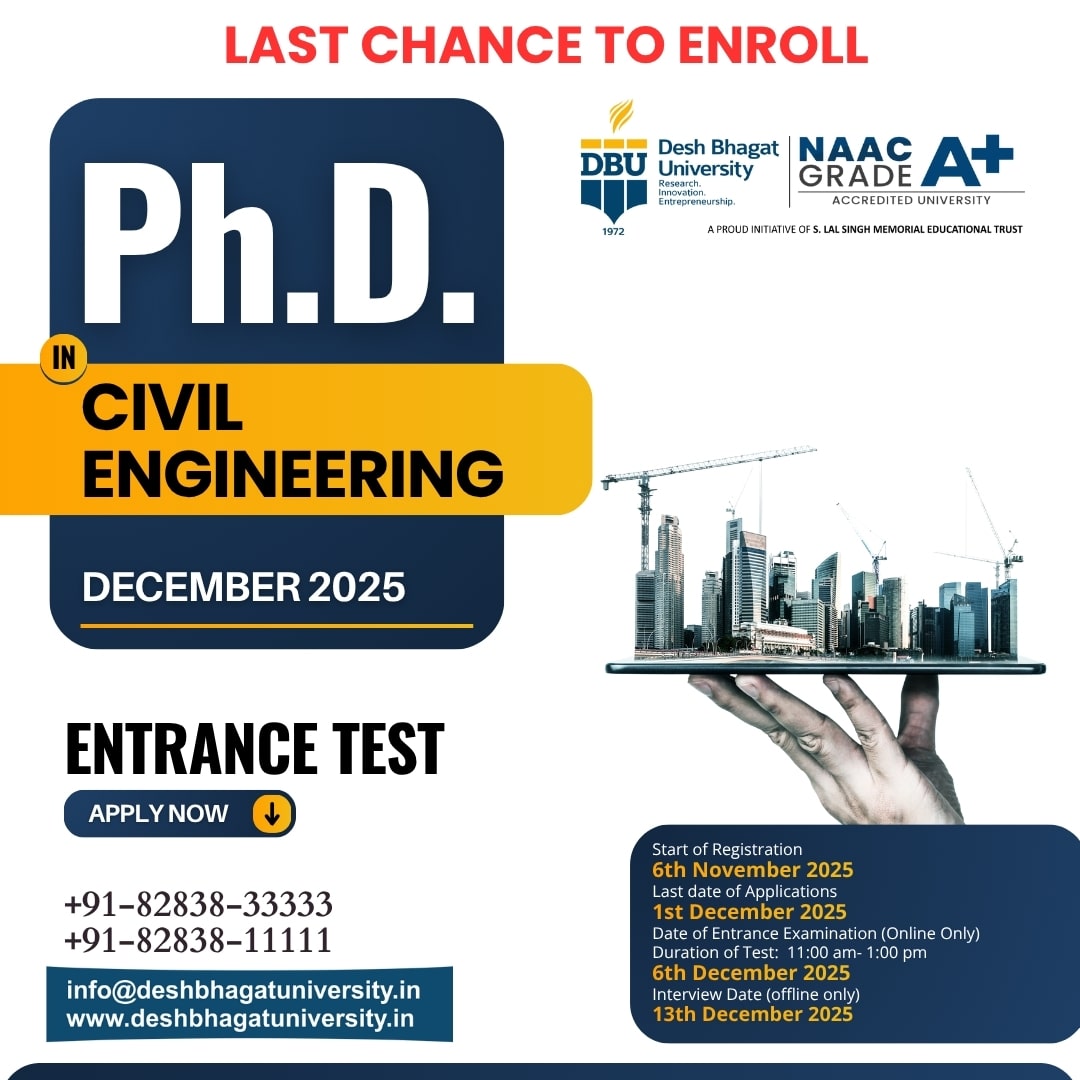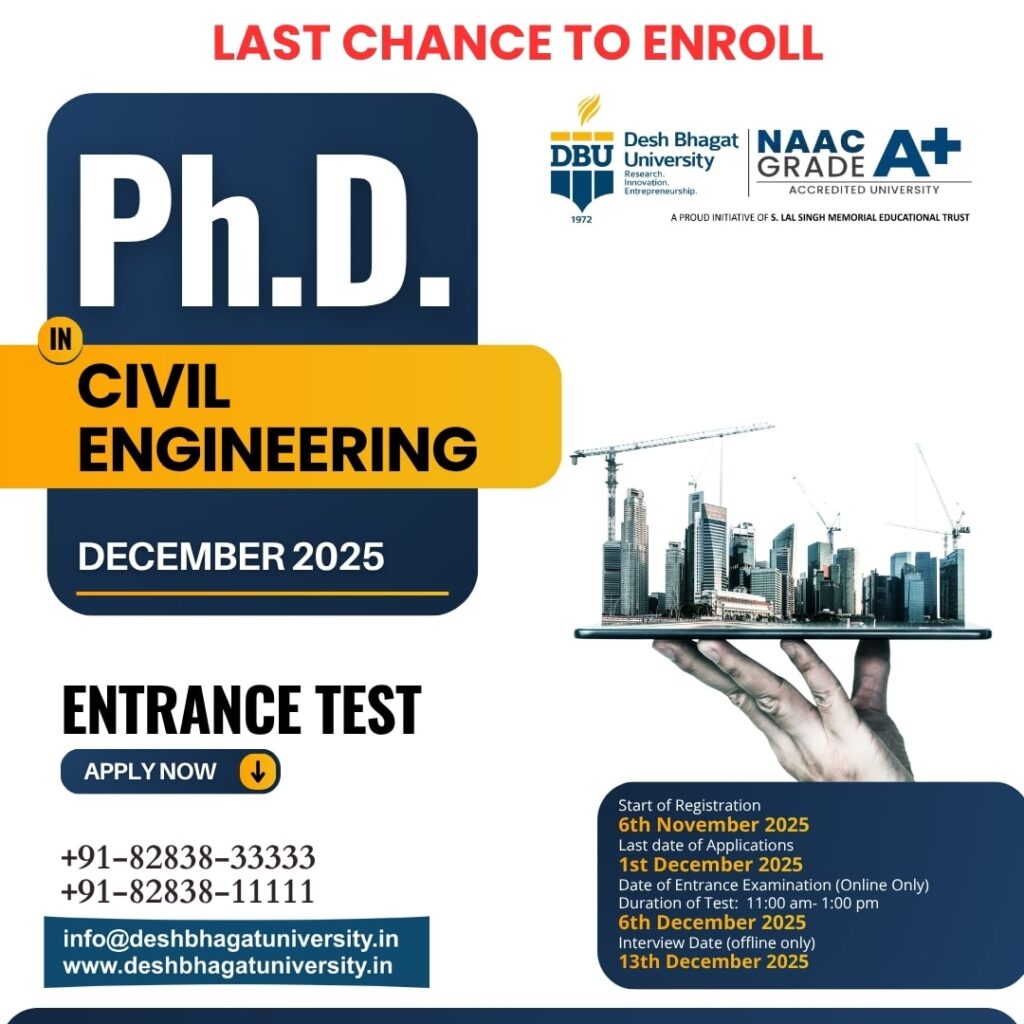Ph.D. in Civil Engineering: Admission, Eligibility, Career
July 15, 2025 2025-11-06 8:03Ph.D. in Civil Engineering: Admission, Eligibility, Career

Ph.D. in Civil Engineering: Admission, Eligibility, Career
A Ph.D. in Civil Engineering is the highest level of education in the field. This advanced research program focuses on solving complex problems related to infrastructure, including sustainable construction, transportation systems, water resources, and environmental engineering. Civil engineering is crucial for building and maintaining infrastructure, and earning a Ph.D. in this field opens up exciting career opportunities in teaching, research, and industry.
Desh Bhagat University (DBU), located in Mandi Gobindgarh, Punjab, offers a comprehensive Ph.D. program in Civil Engineering. The program is designed to provide students with the knowledge and research skills required to make significant contributions to civil engineering and related fields. In this article, we will discuss the Ph.D. program in Civil Engineering at DBU, including eligibility, the admission process, the course structure, research areas, and career opportunities after completing the program.
Why Choose Desh Bhagat University for Your Ph.D. in Civil Engineering?
1. Experienced Faculty
Desh Bhagat University offers an excellent environment for Ph.D. students in Civil Engineering. One of the key reasons to choose DBU is the experienced faculty who have vast knowledge and experience in both teaching and industry. These faculty members guide students through their research projects, helping them focus on finding innovative solutions to problems in civil engineering. The university ensures that students have access to quality mentorship throughout their Ph.D. journey.
2. Advanced Research Facilities
DBU provides state-of-the-art research labs and facilities where students can conduct practical experiments and research. The university’s laboratories are equipped with the latest technologies and tools in civil engineering, allowing students to work on real-world challenges. DBU’s facilities include research centres focused on structural engineering, environmental engineering, geotechnical engineering, and other important areas of civil engineering.
3. Industry Collaboration
DBU has strong partnerships with various industries in civil engineering. These collaborations provide students with opportunities for internships, collaborative research projects, and exposure to real-life challenges in the field. The connections DBU has with the construction, transportation, and environmental engineering industries offer students valuable experience, which enhances their research and career prospects.
4. Strong Curriculum
The Ph.D. program at DBU has a strong curriculum that helps students build a good understanding of research methods and advanced topics in civil engineering. The courses cover topics such as research techniques, the latest trends in civil engineering, sustainable construction practices, and environmental issues. The curriculum also includes subjects related to ethics in research, ensuring that students understand the importance of academic integrity and responsible research practices.
Eligibility Criteria for Ph.D. in Civil Engineering at DBU
To apply for the Ph.D. in Civil Engineering program at DBU, candidates must meet the following eligibility criteria:
1. Educational Qualifications
- Master’s Degree: Candidates should hold a Master’s degree in Civil Engineering or a related field, with a minimum of 55% marks or an equivalent grade.
- Relaxation for Reserved Categories: Candidates from reserved categories (SC/ST/OBC/Differently Abled/EWS) are given a relaxation of 5% in marks, making the requirement 50% for them.
2. National-Level Examinations
Candidates who have qualified for the following national-level exams are exempt from the university’s entrance exam:
- UGC-NET (including JRF)
- CSIR-NET (including JRF)
- GATE (Graduate Aptitude Test in Engineering)
- CEED (Common Entrance Examination for Design)
3. Research Proposal
Candidates are required to submit a research proposal as part of their application. This proposal should outline the area of research they wish to pursue, including objectives and a brief plan of how they will approach their research. The proposal helps the university assess the candidate’s research potential and how their proposed research aligns with the university’s academic goals.
Admission Process for Ph.D. in Civil Engineering
The Ph.D. admission process at DBU is a structured procedure that ensures only qualified candidates are selected for the program. The process includes the following steps:
1. Online Registration
Candidates must complete the online registration process available on the DBU Ph.D. Admission Portal (https://www.admissions.deshbhagatuniversity.in/). The registration typically starts in July and ends by the end of the month. Candidates are required to fill in their personal details, educational background, and research interests.
2. Entrance Examination
After registration, candidates must appear for the Ph.D. entrance exam. The exam is held online and includes of four sections:
- Research Methodology (30 marks)
- Functional English Language (15 marks)
- Knowledge of Civil Engineering (40 marks)
- General Aptitude (15 marks)
The entrance exam assesses the candidate’s research skills, knowledge of civil engineering, and general aptitude. It is designed to determine if the candidate is ready for advanced research in the field of civil engineering.
3. Interview
Candidates who pass the entrance exam will be invited for an interview. The interview is an opportunity for candidates to discuss their research proposal and showcase their knowledge of civil engineering. It also allows the university to assess the candidate’s research potential and their ability to contribute to the field.
4. Final Selection
The final selection is based on the performance in both the entrance exam and the interview. Successful candidates will be notified and asked to complete the admission formalities, including the payment of fees.
Ph.D. Program Coursework and Research Areas
The Ph.D. program in Civil Engineering at DBU includes a mix of coursework and research. The courses are designed to provide students with a strong foundation in research and civil engineering. The research areas focus on important fields such as:
1. Structural Engineering
This field focuses on designing and analyzing structures such as buildings, bridges, and dams. Students will explore new materials, innovative construction techniques, and methods for improving the strength and durability of structures.
2. Transportation Engineering
Transportation engineering deals with the design and maintenance of transportation systems like roads, highways, and railways. Research in this area focuses on improving traffic flow, reducing congestion, and designing safer transportation networks.
3. Environmental Engineering
Environmental engineering addresses issues related to water quality, waste management, and pollution control. Ph.D. students in this field will work on solutions for sustainable infrastructure that protects natural resources and minimizes environmental impact.
4. Geotechnical Engineering
Geotechnical engineering focuses on the behaviour of soil and rock in construction projects. Research in this field helps engineers design stable foundations for buildings, roads, and other infrastructure.
5. Water Resources Engineering
Water resources engineering involves managing water systems for drinking, irrigation, and industrial use. Ph.D. students will research methods to manage water resources efficiently and protect them from contamination.
6. Construction Management
Construction management involves overseeing the planning, design, and construction of large projects. Research in this area focuses on improving construction processes, reducing costs, and ensuring safety and efficiency.
Duration and Flexibility
- Minimum Duration: The minimum duration for the Ph.D. in Civil Engineering at DBU is 3 years.
- Maximum Duration: The maximum duration is 6 years. Extensions beyond 6 years are possible under specific circumstances, subject to university approval.
This flexible duration allows students to conduct thorough research, write their thesis, and contribute to advancing knowledge in civil engineering.

Entrance Exams 2025
| Event | Date | Time / Notes |
|---|---|---|
| Start of Online Registration | July 9, 2025 | |
| Last Date to Fill Online Application | July 28, 2025 | |
| Entrance Examination (Online) | August 2, 2025 | 11:00 am – 1:00 pm |
| Result of Entrance Examination | August 5, 2025 | |
| Interview (Offline Only) | August 9, 2025 | 10:00 am – 1:00 pm Venue: Mahapragya Hall, DBU Campus |
| Result of Interview | August 9, 2025 | 03:00 pm |
| Students Biometric Registration | August 9, 2025 | From 03:00 pm onwards |
| Fee Deposit Begins | August 9, 2025 | From 03:30 pm onwards |
| Last Date for Fee Deposit | August 18, 2025 |
Career Opportunities after Ph.D. in Civil Engineering
A Ph.D. in Civil Engineering from DBU opens up many career paths, both in academia and industry. Here are some potential career options:
1. Academic Careers
Graduates can become professors, researchers, or lecturers in universities and colleges. They will teach the next generation of engineers and conduct research in civil engineering.
2. Research Institutions
Graduates can work for government or private research institutions, contributing to national and global projects related to infrastructure, sustainability, and environmental issues.
3. Industry
Civil engineering companies, construction firms, and infrastructure development agencies require highly skilled engineers. Ph.D. graduates can take roles as senior engineers, R&D specialists, or project managers in these industries.
4. Entrepreneurship
Some Ph.D. graduates choose to start their own companies, such as engineering consultancies or construction firms. This allows them to apply their research and knowledge in real-world projects.
Conclusion
A Ph.D. in Civil Engineering from Desh Bhagat University offers an excellent opportunity to advance your career in the field of civil engineering. With experienced faculty, modern research facilities, and strong industry connections, DBU provides the ideal environment for students to pursue innovative research. Whether you choose to work in academia, research, or industry, a Ph.D. from DBU will equip you with the skills and knowledge to make significant contributions to civil engineering and the world.
FAQs
1. What is a Ph.D. in Civil Engineering?
A Ph.D. in Civil Engineering is an advanced academic degree. It focuses on solving complex problems in civil engineering fields like construction, transportation, and environmental issues. Students conduct original research that can lead to new technologies or methods in civil engineering. It prepares graduates for roles in academia, research, and industry.
2. Why should I choose Desh Bhagat University for a Ph.D. in Civil Engineering?
Desh Bhagat University (DBU) offers an excellent Ph.D. program in Civil Engineering. The university provides experienced faculty, state-of-the-art research facilities, and strong connections with industries. DBU also encourages collaboration between departments, giving students a chance to learn and grow in a supportive environment, making it a great choice for your Ph.D. studies.
3. What are the eligibility criteria for the Ph.D. program in Civil Engineering at DBU?
To apply for the Ph.D. in Civil Engineering at DBU, you need a Master’s degree in Civil Engineering or a related field with at least 55% marks. Candidates from reserved categories like SC/ST/OBC may have a 5% relaxation. You must also submit a research proposal to apply, outlining your intended area of study.
4. Is there an entrance exam for the Ph.D. program in Civil Engineering?
Yes, there is an entrance exam for the Ph.D. program. The exam covers topics like research methodology, civil engineering fundamentals, and general aptitude. However, if you have passed national-level exams like GATE or UGC-NET, you may be exempt from taking the exam. After the exam, shortlisted candidates will be invited for an interview.
5. What is the duration of the Ph.D. program in Civil Engineering at DBU?
The Ph.D. in Civil Engineering at DBU typically takes 3 years to complete, but you can extend it to 6 years if needed. This flexible duration gives students ample time to focus on their research, complete their thesis, and make valuable contributions to the field of civil engineering.
6. What subjects will I study during the Ph.D. program?
The Ph.D. program at DBU includes courses on Research Methodology, Emerging Trends in Civil Engineering, and Research Publications and Ethics. These courses help students develop skills for conducting research and producing high-quality work. They also learn about sustainable construction, transportation engineering, and environmental concerns in civil engineering.
7. What kind of research will I do in the Ph.D. program?
The research in the Ph.D. in Civil Engineering program at DBU focuses on important areas like structural engineering, transportation systems, water resources, and environmental engineering. You may work on projects related to infrastructure development, smart cities, pollution control, or improving construction materials and methods.
8. Can I work while pursuing my Ph.D. in Civil Engineering?
It depends on your situation. Some students may choose to work part-time while pursuing their Ph.D. in Civil Engineering. However, the program requires a lot of dedication and research, so balancing work and studies may be challenging. You can discuss flexible options with the university to manage both.
9. What career options do I have after completing my Ph.D. in Civil Engineering?
After completing your Ph.D. in Civil Engineering, you can pursue careers in academia, research institutions, government agencies, or private industry. Many graduates become professors or researchers, while others work in construction companies, infrastructure development firms, or start their own engineering consultancies.
10. Are there scholarships available for Ph.D. students at DBU?
Yes, DBU offers scholarships to eligible Ph.D. students. These scholarships are based on merit and may be available to students who perform well in the entrance exam or have a strong academic background. Reserved category students may also receive fee concessions.






